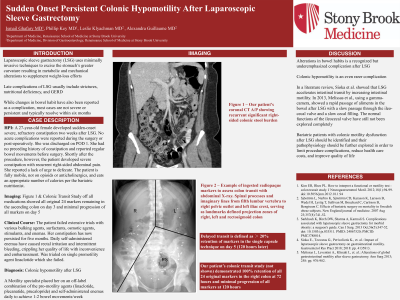Tuesday Poster Session
Category: Functional Bowel Disease
P3384 - Sudden Onset Persistent Colonic Hypomotility After Laparoscopic Sleeve Gastrectomy
Tuesday, October 24, 2023
10:30 AM - 4:00 PM PT
Location: Exhibit Hall

Has Audio

Ismail Ghafary, MD
Stony Brook University Hospital
Stony Brook, NY
Presenting Author(s)
Ismail Ghafary, MD, Phillip Key, MD, Leslie Klyachman, MD, Alexandra Guillaume, MD
Stony Brook University Hospital, Stony Brook, NY
Introduction: Laparoscopic sleeve gastrectomy (LSG) is a common bariatric procedure for morbidly obese patients. LSG uses minimally invasive techniques to excise the stomach’s greater curvature resulting in metabolic and mechanical alterations to supplement weight-loss efforts. Late complications of LSG usually include strictures, nutritional deficiency, and GERD. While changes in bowel habit have also been reported as a complication, most cases are not severe or persistent and typically resolve within six months.
Case Description/Methods: A 27-year-old female developed sudden-onset severe, refractory constipation two weeks after LSG. No acute complications were reported during the surgery or post-operatively. She was discharged on POD 1. She had no preceding history of constipation and reported regular bowel movements before surgery. Shortly after the procedure, however, the patient developed severe constipation with recurrent right-sided abdominal pain. She reported a lack of urge to defecate. The patient is fully mobile, not on opioids or anticholinergics, and eats an appropriate number of calories per the bariatric nutritionist. The patient failed extensive trials with various bulking agents, surfactants, osmotic agents, stimulants, and enemas. Cross-sectional imaging has consistently demonstrated significant right-sided colonic stool burden. Her constipation has now persisted for five months. Daily self-administered enemas have caused rectal irritation and intermittent bleeding, crippling her quality of life with inconvenience and embarrassment. The patient was trialed on single promotility agent linaclotide which she failed. She also underwent a Sitz Marker study off all medications, showing all original 24 markers remaining in the ascending colon on day 3 and minimal progression of all markers on day 5, confirming colonic hypomotility. A GI motility specialist placed her on an off-label combination of the pro-motility agents (linaclotide, plecanatide, prucalopride) and self-administered enemas daily to achieve 1-2 bowel movements a week, otherwise she becomes constipated and develops right-sided abdominal discomfort.
Discussion: Alterations in bowel habits is a recognized but underemphasized complication after LSG. Colonic hypomotility is an even rarer complication. Bariatric patients with colonic motility dysfunction after LSG should be identified and their pathophysiology should be further explored in order to limit procedure complications, reduce health care costs, and improve quality of life.

Disclosures:
Ismail Ghafary, MD, Phillip Key, MD, Leslie Klyachman, MD, Alexandra Guillaume, MD. P3384 - Sudden Onset Persistent Colonic Hypomotility After Laparoscopic Sleeve Gastrectomy, ACG 2023 Annual Scientific Meeting Abstracts. Vancouver, BC, Canada: American College of Gastroenterology.
Stony Brook University Hospital, Stony Brook, NY
Introduction: Laparoscopic sleeve gastrectomy (LSG) is a common bariatric procedure for morbidly obese patients. LSG uses minimally invasive techniques to excise the stomach’s greater curvature resulting in metabolic and mechanical alterations to supplement weight-loss efforts. Late complications of LSG usually include strictures, nutritional deficiency, and GERD. While changes in bowel habit have also been reported as a complication, most cases are not severe or persistent and typically resolve within six months.
Case Description/Methods: A 27-year-old female developed sudden-onset severe, refractory constipation two weeks after LSG. No acute complications were reported during the surgery or post-operatively. She was discharged on POD 1. She had no preceding history of constipation and reported regular bowel movements before surgery. Shortly after the procedure, however, the patient developed severe constipation with recurrent right-sided abdominal pain. She reported a lack of urge to defecate. The patient is fully mobile, not on opioids or anticholinergics, and eats an appropriate number of calories per the bariatric nutritionist. The patient failed extensive trials with various bulking agents, surfactants, osmotic agents, stimulants, and enemas. Cross-sectional imaging has consistently demonstrated significant right-sided colonic stool burden. Her constipation has now persisted for five months. Daily self-administered enemas have caused rectal irritation and intermittent bleeding, crippling her quality of life with inconvenience and embarrassment. The patient was trialed on single promotility agent linaclotide which she failed. She also underwent a Sitz Marker study off all medications, showing all original 24 markers remaining in the ascending colon on day 3 and minimal progression of all markers on day 5, confirming colonic hypomotility. A GI motility specialist placed her on an off-label combination of the pro-motility agents (linaclotide, plecanatide, prucalopride) and self-administered enemas daily to achieve 1-2 bowel movements a week, otherwise she becomes constipated and develops right-sided abdominal discomfort.
Discussion: Alterations in bowel habits is a recognized but underemphasized complication after LSG. Colonic hypomotility is an even rarer complication. Bariatric patients with colonic motility dysfunction after LSG should be identified and their pathophysiology should be further explored in order to limit procedure complications, reduce health care costs, and improve quality of life.

Figure: Image 1: CT Showing Recurrent Significant Right-Sided Colonic Stool Burden
Disclosures:
Ismail Ghafary indicated no relevant financial relationships.
Phillip Key indicated no relevant financial relationships.
Leslie Klyachman indicated no relevant financial relationships.
Alexandra Guillaume indicated no relevant financial relationships.
Ismail Ghafary, MD, Phillip Key, MD, Leslie Klyachman, MD, Alexandra Guillaume, MD. P3384 - Sudden Onset Persistent Colonic Hypomotility After Laparoscopic Sleeve Gastrectomy, ACG 2023 Annual Scientific Meeting Abstracts. Vancouver, BC, Canada: American College of Gastroenterology.
